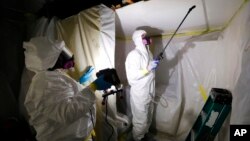The Environmental Protection Agency announced Monday a comprehensive ban on asbestos, targeting the last remaining form of the chemical still used in the United States.
Although asbestos was the first chemical banned under a 2016 chemical safety law removing it from many consumer products, the cancer-causing material is still used in some chlorine bleach, brake pads and other products.
The type of asbestos now being banned is called chrysotile asbestos, a form of the carcinogenic substance used by the chlor-alkali industry and largely imported from Brazil and Russia. The industry mostly produces bleach, caustic soda and other products used in water treatment.
While prohibiting importation, the new ban aims to gradually implement restrictions on chlor-alkali usage over five years or more, aiming to facilitate what the agency terms "a reasonable transition period."
The EPA first banned asbestos in 1989, but the rule was largely overturned by a appellate court decision in 1991 that weakened the EPA’s authority — under the 1976 Toxic Substances Control Act — to address risks to human health from asbestos and other chemicals.
Prior to Monday’s announcement, the National Association of Clean Water Agencies, representing 350 publicly owned wastewater treatment facilities, expressed concerns that an immediate asbestos ban would likely lead to shortages and price hikes for chlorine and other chemicals crucial to water treatment and disinfection.
A ban on most other uses of asbestos will take effect within two years, such as its use in producing aftermarket automobile brakes.
“The science is clear — asbestos is a known carcinogen that has severe impacts on public health," said EPA Administrator Michael Regan. "That’s why EPA is so proud to finalize this long-needed ban on ongoing uses of asbestos.”
The EPA also said the announcement was part of President Joe Biden’s Cancer Moonshot, a government-wide initiative to end cancer in the United States. Exposure to asbestos is a known cause of lung cancer, mesothelioma and some other cancers, and it is linked to more than 40,000 deaths in the U.S. each year.
Scott Faber, senior vice president of the Environmental Working Group — an advocacy group that pushed to ban asbestos — approved of the EPA’s announcement.
"For too long, polluters have been allowed to make, use and release toxins like asbestos and PFAS without regard for our health,” Faber said. "Thanks to the leadership of the Biden EPA, those days are finally over."
PFAS, or perfluoroalkyl and polyfluoroalkyl substances, are synthetic chemicals used in a variety of consumer products.
The EPA has been carrying out a separate initiative to determine the health effects of asbestos in older buildings.
Some information for this report came from Reuters and The Associated Press.





